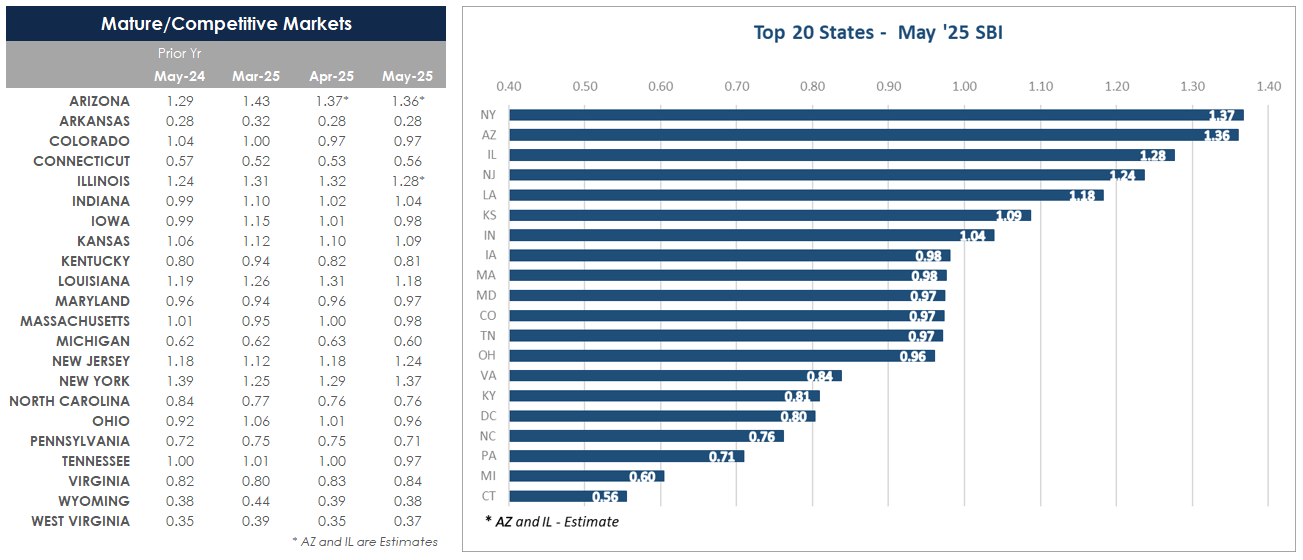RubinBrown Sports Betting Index: May 2025 Analysis
RubinBrown Sports Betting Index: May 2025 Analysis
May Sports Betting Index (SBI): Handle Slips, Hold Climbs, and Uncertainty Ahead
In the chart below, we present our RubinBrown Sports Betting Index (SBI). The SBI is based on our proprietary index of the leading sports betting states in the U.S. To continue to best reflect current market conditions, we’ll occasionally adjust the components of the index. To better compare competitive conditions, our index numbers focus in on a group of mature, competitive states. Therefore, a state with an index score of 1.15 had a raw index score of 15% greater than the average, while a 0.90 index score shows a 10% lower than average result.
LEARN MORE ABOUT THE RUBINBROWN SBI
May marked a second straight dip in sports betting handle, with activity slowing despite ongoing NBA Playoffs, MLB, and WNBA action, none of which rival the NFL in engagement. However, operators saw a reversal in fortune with hold rates climbing, surpassing 10% in major markets like Pennsylvania, New York, New Jersey, Ohio, and Maryland.
As summer slows betting activity, three issues take center stage: growing tax pressure, the rise of alternative markets, and evolving regulation. With bettors stepping back, the question looms: what's next for the industry as a whole?

Market Dynamics, Not Just Taxes, Are Shaping the Future
The maturing U.S. market faces a familiar tension: regulated operators navigate pressure from lawmakers and users, while agile newcomers, like event markets and sweepstakes, explore less-restricted terrain. But blaming tax rates alone for the industry’s innovation lag oversimplifies the challenge.
In truth, consumers are shaping the market based on convenience, cultural relevance, and entertainment. Incumbents, focused on long-term strategies like regulated iGaming, need to stay in the good graces of regulators and cannot operate on the edges to meet those consumer needs. This may give the appearance of having deprioritized sports-specific innovation, thus slowing progress along with the well-known issues from taxation and regulation.
Meanwhile, tax pressures, especially in high-tax states leave operators limited room to reinvest. And with market consolidation favoring dominant players, there's even less incentive to innovate—why build what will be quickly copied?
Still, this pause may reflect strategic realignment, not burnout. Many see iGaming as the bigger prize down the road, suggesting the apparent stagnation is a matter of resource allocation, not imagination.
Event Markets: Novelty or Niche?
Platforms like Kalshi and Polymarket are often framed as sportsbook alternatives—but for whom? Kalshi saw nearly $2B in 2024 trade volume, much of which is suspected to be coming from unregulated sports betting states like Texas and California. Yet little is known about their users or how they compare to traditional sports bettors.
While these markets are new to the sports betting landscape, they resemble niche financial tools more than consumer-facing apps. Their appeal lies in regulatory structure, not user experience or entertainment value, limiting their disruptive potential.
Sweepstakes and Social Gaming: Where Innovation Lives?
Sweepstakes platforms like Fliff and Rebet offer unique new options in states without legal sports betting. With lower costs and broader reach, they blend gamification and social engagement in ways regulated books often can’t. These operators are doubling down on user experience and community-building.
But uncertainty lingers. Reliable data on user satisfaction or complaints is limited. While sweepstakes and offshore operators may face many user complaints and criticisms that don’t get addressed properly, users of regulated sports books file more complaints because they can—with regulators to support them.
Speculation, Consolidation, and the Road Ahead
Talk of consolidation and market exits persists but remains speculative. Despite margin pressure, operators haven’t fled high-tax states. Licensing appears to hold long-term value.
Yet without updated tax structures and streamlined licensing, there's a risk of losing users to faster, cheaper, more entertaining alternatives. Regulators argue their frameworks work (if followed) but most users don’t seem to prioritize regulation. They're seeking personalized, engaging experiences, while operators shift toward more profitable verticals.
Final Thoughts
The 2025 betting landscape proves that innovation doesn’t hinge on changing rules—it depends on shifting incentives. Whether driven by lawmakers, investors, or users, pressure is mounting. The next disruption will likely emerge where regulation, entertainment, and psychology meet.

Published: 07/10/2025
Readers should not act upon information presented without individual professional consultation.
Any federal tax advice contained in this communication (including any attachments): (i) is intended for your use only; (ii) is based on the accuracy and completeness of the facts you have provided us; and (iii) may not be relied upon to avoid penalties.